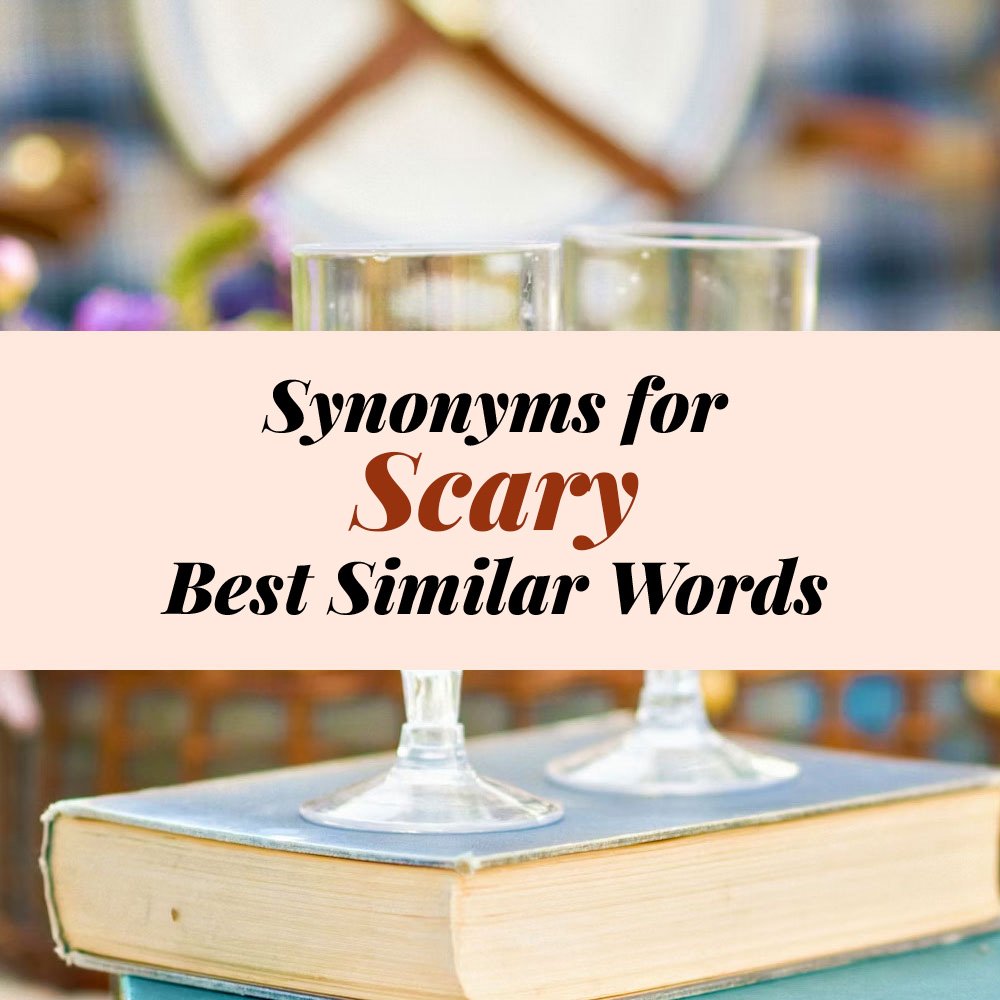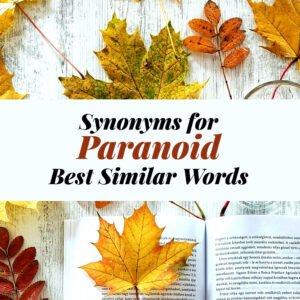When we hear the word scary, we often think about something that makes us feel fear or nervous. But there are many other words we can use to say the same idea. For example, words like frightening, terrifying, or creepy can also describe something that gives fear. Using different words makes your speaking and writing more interesting. In this article, we will explore many useful synonyms for scary.
| Synonyms | Example |
|---|---|
| Frightening | The movie was so frightening that she could not sleep at night. |
| Terrifying | The terrifying sound in the dark made him run quickly. |
| Creepy | That old house looks creepy when the wind blows through it. |
| Spooky | We told spooky stories around the campfire. |
| Chilling | The chilling scream came from the forest. |
| Hair-raising | It was a hair-raising ride on the roller coaster. |
| Eerie | The eerie silence made everyone feel uncomfortable. |
| Alarming | The alarming news scared the children. |
| Intimidating | The tall man looked intimidating to the small kids. |
| Dreadful | The dreadful accident shocked the whole town. |
| Horrifying | It was a horrifying scene to watch. |
| Petrifying | The ghost story was petrifying for the little boy. |
| Shocking | The shocking picture made her cover her eyes. |
| Disturbing | The disturbing dream stayed in his mind all day. |
| Spine-tingling | The spine-tingling sound filled the dark room. |
| Menacing | The menacing look from the stranger scared her. |
| Fearsome | The fearsome animal roared loudly. |
| Ghastly | The ghastly face appeared in the mirror. |
18 Different Ways to Say SCARY: Another Word for SCARY
Frightening
The word frightening describes something that makes people feel afraid very quickly. It can be a sound, a place, or even a person. We often use frightening when something gives sudden fear but does not always last long. Many movies or ghost stories are frightening because they surprise us. People may also use it when talking about strange or bad situations.
- The frightening noise woke everyone at midnight.
- That dog has a frightening bark.
- It was a frightening moment during the storm.
- The story was frightening but exciting too.
- She had a frightening dream about monsters.
- His frightening words made her nervous.
Terrifying
The word terrifying means very, very scary. It is stronger than frightening. When something is terrifying, it can make people freeze or scream. We often use it for extreme situations, like a dangerous event or a scary movie scene. Terrifying can describe both real-life dangers and imaginary ones.
- The terrifying thunder made the kids cry.
- He had a terrifying experience in the mountains.
- The monster looked terrifying in the dark.
- It was a terrifying thought of being alone.
- The ride was terrifying but fun.
- A terrifying scream came from the cave.
Creepy
The word creepy is often used when something makes you feel strange or uncomfortable. It is not always about danger, but it still feels scary. Creepy can describe people, places, or things that give you a bad feeling. For example, an old house with broken windows can feel creepy.
- The creepy doll sat on the shelf.
- The woods were creepy at night.
- He gave her a creepy smile.
- That movie had a creepy scene.
- The creepy shadows moved on the wall.
- It was a creepy sound under the bed.
Spooky
The word spooky is often used for fun scary feelings, like Halloween decorations or ghost stories. It describes something that feels mysterious or strange but is not always dangerous. Many people like spooky stories because they give excitement. Spooky is often used with things that remind us of ghosts.
- We walked into a spooky house on Halloween.
- The spooky music played in the background.
- He told a spooky story by the fire.
- The forest looked spooky in the moonlight.
- It was a spooky but fun experience.
- The spooky shadows danced on the wall.
Chilling
The word chilling is used when something gives you a cold feeling of fear. It can describe a sound, a look, or even a story. Chilling fear is deep and makes your body shiver. Many people say chilling when something touches their heart with fear and nervousness.
- The chilling scream shocked everyone.
- That movie had a chilling scene.
- His chilling words made her scared.
- The chilling silence filled the room.
- A chilling wind blew in the night.
- The chilling news upset the town.
Hair-raising
The word hair-raising means something so scary that it feels like your hair stands up. It is often used for strong feelings of fear or excitement. People often use this word when they talk about dangerous rides, scary adventures, or shocking events. It shows both fear and thrill.
- The hair-raising ride scared me.
- It was a hair-raising story.
- The hair-raising scream was loud.
- We had a hair-raising moment on the road.
- That ghost tale was hair-raising.
- The hair-raising storm shook the house.
Eerie
The word eerie describes something strange and ghost-like. It can be quiet, dark, or mysterious. An eerie place makes people feel uncomfortable because it does not feel normal. We often use eerie for silence, sounds, or empty places. It is a soft but deep kind of scary.
- The eerie silence was strange.
- An eerie sound came from the woods.
- The eerie light scared her.
- The street looked eerie at night.
- The old house was eerie inside.
- That movie had an eerie atmosphere.
Alarming
The word alarming is used when something makes people feel sudden worry or fear. It can be about danger or shocking news. We use alarming not only for scary situations but also for surprising or upsetting ones. It makes people alert and careful.
- The alarming noise made them run.
- She got alarming news yesterday.
- His alarming words shocked me.
- The alarming situation scared everyone.
- The baby made an alarming cry.
- There was an alarming rise in crime.
Intimidating
The word intimidating describes something or someone that makes you feel smaller or weaker. It is not always direct danger, but it makes people afraid to act. Many people use intimidating to describe strong people, difficult tasks, or scary looks.
- The teacher looked intimidating.
- The tall building was intimidating.
- His deep voice was intimidating.
- The exam felt intimidating.
- That man’s stare was intimidating.
- The big dog looked intimidating.
Dreadful
The word dreadful describes something very bad and scary. It can mean terrible, shocking, or painful. We often use dreadful when something feels horrible and full of fear. Many sad or scary events are called dreadful.
- The dreadful storm broke houses.
- It was a dreadful accident.
- He made a dreadful mistake.
- The dreadful night was long.
- She had a dreadful dream.
- The dreadful news spread quickly.
Horrifying
The word horrifying means something that gives great fear and shock. It is very strong and used for serious scary situations. People often use horrifying when describing terrible sights, events, or stories. It shows deep fear.
- The horrifying scene made me sick.
- That monster was horrifying.
- The horrifying scream woke us.
- It was a horrifying story.
- She saw a horrifying accident.
- The horrifying movie scared us all.
Petrifying
The word petrifying means so scary that it makes you freeze and not move. It is very strong, and people often use it for moments of great fear. Petrifying describes experiences that shock the body and mind.
- The petrifying sound made her cry.
- He saw a petrifying shadow.
- That was a petrifying dream.
- The ghost gave a petrifying look.
- The petrifying moment stayed in his memory.
- It was a petrifying movie scene.
Shocking
The word shocking is often used when something surprises in a scary or upsetting way. It is not always dangerous but can make people afraid. Shocking can be about news, sights, or actions that are hard to believe.
- The shocking accident scared us.
- It was a shocking story.
- The shocking noise made her jump.
- He gave me a shocking look.
- The shocking event was on TV.
- She saw a shocking picture.
Disturbing
The word disturbing means something that bothers the mind and makes people feel fear or discomfort. It is not always loud or direct, but it stays in the thoughts. Disturbing events or images often make people worried.
- The disturbing dream scared him.
- She saw a disturbing picture.
- It was a disturbing story.
- His disturbing words made her sad.
- The disturbing movie stayed in my head.
- A disturbing sound came from the basement.
Spine-tingling
The word spine-tingling describes something that makes your back shiver with fear or excitement. It is often used for stories, music, or sounds that give strong feelings. Many people use it for fun scary experiences.
- The spine-tingling scream was loud.
- It was a spine-tingling movie.
- The spine-tingling story was told at night.
- That song had a spine-tingling voice.
- The spine-tingling ride was exciting.
- We felt a spine-tingling fear.
Menacing
The word menacing means something looks dangerous or threatening. It shows that something bad might happen soon. A menacing person, sound, or look makes others afraid of harm.
- The menacing dog growled loudly.
- His menacing eyes scared her.
- The menacing storm came closer.
- That man looked menacing.
- The menacing sound worried us.
- It was a menacing shadow.
Fearsome
The word fearsome means something strong, scary, or dangerous. It can be about animals, people, or events that make us afraid. Fearsome is used for things that look powerful.
- The fearsome tiger roared.
- He gave a fearsome shout.
- The fearsome storm hit the city.
- That was a fearsome enemy.
- The fearsome scene shocked people.
- A fearsome sound came from the cave.
Ghastly
The word ghastly means something very unpleasant and scary. It can be about a face, a sight, or an event. Ghastly shows strong fear and shock.
- She saw a ghastly face.
- The ghastly accident upset the town.
- It was a ghastly scene.
- The ghastly monster scared him.
- The ghastly noise filled the room.
- His ghastly look made her scream.

Final Thoughts
There are many words we can use instead of scary. Each word gives a special meaning, from creepy and spooky to terrifying and horrifying. When you know these words, you can make your speaking and writing richer and more interesting. Try to use them in daily life to sound more powerful and expressive.









